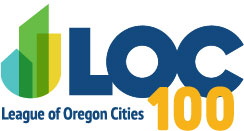LOC News
Third Special Session Finishes Business
By Jim McCauley, LOC Legislative Director
The Oregon Legislature convened Monday morning to set rules for the state’s third special session of 2020 and to take up legislative concepts and budget items. The Capitol was closed to the public, but several right wing groups converged on the building to disrupt legislative business. Protesters broke windows in an attempt to gain access to the Capitol. After a protester sprayed police with bear spray, four arrests were made by the Oregon State Police, who were aided by officers from the Salem Police Department. Following the incident, the state police declared an unlawful assembly, and the crowd was dispersed. Some Senate and House Republican members voted in opposition to the rules based on the lack of public access to the Capitol; however there were not enough votes to derail the proposed rules for the session.
Overall, there were five bills considered, including a budget bill. The only legislation that did not move forward was SB 1803, which would have provided liability protection for hospitals. The primary purpose of this third special session was to gain the Legislature’s approval of an additional $800 million for: the state’s ongoing COVID-19 response; additional relief for businesses; assistance for communities impacted by wildfires; and additional relief for renters and landlords.
Legislation Under Consideration
SB 1801 – Allows the holder of a full on-premises sales license to sell and deliver mixed drinks or a single serving of wine in sealed containers for off-premises consumption. The bill allows two call drinks, or a serving of wine, to be delivered or sold for carry out per substantial food items ordered on a ticket. The Oregon Liquor Control Commission is poised to pass rules elaborating on what constitutes a food order to meet requirements of the bill. Drinks must be sealed in a container in a manner that makes it obvious if the seal has been broken. The legislation also limits fees third party delivery services may charge a restaurant. The bill is intended to allow restaurants to better operate during COVID restrictions. [Vote count: Senate (21-3-6), House (50-4-6)]
SB 1803 – Would have provided protections to hospitals and healthcare settings but was not advanced in committee. Cities and other private sector interests had sought tort protection for entities that have followed public health guidance.
SB 5731 – Appropriates $800 million in the state’s General Fund for allocations during current biennium. This funding comes from the projected $1.8 billion 2019-21 ending fund balance.
$600 million of this funding will go to the Emergency Board, which will determine the exact use for the money before the start of the 2021 legislative session. Any unused funds will be available during the regular budget process. [Vote count: Senate (24-0-6), House (52-2-6)]
The $600 million for the Emergency Board is broken out as follows:
- $100 million to the Emergency Fund for general purposes;
- $400 million of special purpose funding dedicated to responding to the pandemic. Possible uses include resources for schools, colleges and university students, energy assistance, business support (rent relief, technical assistance, and PPE), grants to support undocumented workers and tribes, and additional resources for the Oregon Health Authority; and
- $100 million for wildfire recovery, prevention, and preparedness. Possible uses include debris removal, fire resiliency measures, and assistance for wildfire victims.
The remaining $200 million is dedicated to the Oregon Housing and Community Services Department for the following:
- $150 million for a grant program for residential landlords described in HB 4401; and
- $50 million for tenant-based rent assistance, which will also be paid to landlords.
HB 4401 – Extends the moratorium on residential evictions for nonpayment until June 30, 2021, for tenants who declare a financial hardship due to COVID-19. The bill provides the program framework for $200 million in rental assistance funding included in SB 5731. The package is the product of a workgroup of advocates, tenant groups, and landlords that met over the last several months. It is intended as a compromise approach to meet the needs of both tenants and landlords, prioritizing smaller landlords and those in greatest financial need. [Vote count: Senate (18-6-6), House (39-15-6)]
HB 4401 provides the following:
- Extends the eviction moratorium through June 2020 to keep families housed through the school year;
- Directs Oregon Housing and Community Services (OHCS) to provide distributions to residential landlords for 80 percent of rent owed after April 1, 2020. Landlords may submit one application to OHCS for back rent owed by all tenants in arrears who have given the landlord a signed declaration of financial hardship. This gives landlords 80% of back rent owed immediately rather than having to go through the arduous process of individual court and collection action that may leave them with nothing. Landlords must agree to forgive the remaining 20 percent of unpaid rent due if they receive a distribution from OHCS for rent owed. Landlords must also agree to repay OHCS if the landlord receives a payment from a tenant for the amount owed; and
- Gives renters more time to pay back rent if their landlord doesn’t access the compensation fund.
For more information on the Landlord Compensation Fund and to sign up for email updates, visit the OHCS website.
HB 4402 – Limits liability of school districts, union high schools, education service districts, public charter schools and community colleges for certain claims arising during the COVID-19 emergency period. HB 4402 will prevent tort claims against schools for acts and omissions during if they comply with established COVID prevention protocols such as OSHA and OHA rules. [Vote count: Senate (46-8-6), House (20-4-6)]
Contact: Jim McCauley, Legislative Director - jmccauley@orcities.org
Last Updated 12/22/20

